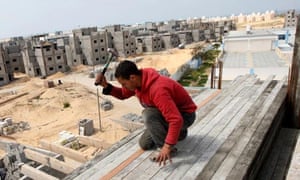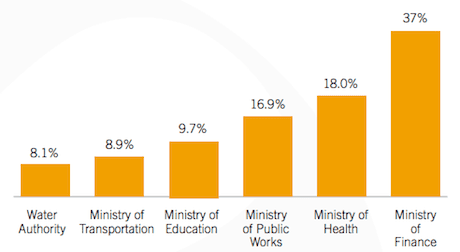Its legal status is contested, its land is divided and thousands of its citizens emigrate every year – so how does Palestine’s economy function?
 A Palestinian labourer works at a construction site of a residential project funded by the United Nations Relief and Works Agency for Palestine Refugees (UNRWA) Photograph: Said Khatib/Getty Images
A Palestinian labourer works at a construction site of a residential project funded by the United Nations Relief and Works Agency for Palestine Refugees (UNRWA) Photograph: Said Khatib/Getty Images
Mona Chalabi, The Guardian, 14 October 2013
These days, the economic health of any country relies on that of others – but the Palestinian Territories are exceptionally dependent on factors outside of them. On what do Palestinian economic fortunes rely on and how does the future look?
Israel
Israeli occupation in Palestinian territories, the barrier it has constructed along and within the West Bank as well as its land, air and sea blockades in the Gaza strip have placed severe limitations on the success of Palestinian economic policies.
A complex web of checkpoints and roadblocks make it difficult for Palestinians to travel within the Palestinian Territories for jobs, to bank or to trade. Farmers whose land is now behind the barrier are required to apply for ‘visitor permits’ which Israel regularly rejects – in Akkaba it approved 49% of applications in 2011, and just 20% by 2012. More recently, a report from the World Bank found that Israeli restrictions in the West Bank alone cost the Palestinian economy $3.4bn (£2.1bn) a year, or 35% of its GDP.
 Image: Visualizing Palestine.
Image: Visualizing Palestine.
Israel may have policies that hamper the Palestinian economy, but it is also a major source of Palestinian livelihoods. Unemployment is exceptionally high in the West Bank and the Gaza strip where almost 1 in 4 adults are jobless. According to the latest report from the International Labour Office, some 87,000 Palestinians aged over 15 (around 10% of all those with jobs) are employed in Israel and its settlements.
The majority of these Palestinians are employed in the construction sector, followed by manufacturing and agriculture – all of which tend to be characterised by insecurity. A survey by Palestine’s main trade union found that only 11% of workers in Israeli settlements said they had job security, over half received less than the minimum wage and 65% had been exposed to toxic substances.
Palestinian authority
Corruption is rampant inside many of Palestine’s institutions. In its latest report, the Coalition for Integrity and Accountability (part of the Transparency International Secretariat) produced a catalogue of corruption cases within Palestine’s public bodies. In just over six months, the Corruption Crimes Court received 41 cases, which they say:
included embezzlement, money laundering, fraud, and exploitation of position for personal gain. Those involved in these crimes were high-level employees, such as heads of government divisions, who were conspiring with lower and intermediate level employees.
Pharmaceutical companies and their agents have also been accused of distributing expired food and medicine – though the risks of obtaining evidence on this means that often these crimes go unpunished.
In a 2012 opinion poll, 40% of Palestinians said they had used various forms of corruption to receive a certain public service. In 2011, 47 thousand traffic tickets had not been paid and tax evasion represented 40% of all tax revenues.
 Image: AMAN. Ministries most prone to corruption in Palestine during 2012
Image: AMAN. Ministries most prone to corruption in Palestine during 2012
Palestinian diaspora
The estimated one million Palestinians who have emigrated since 1948 (as well as their children) serve as a vital lifeline for Palestinians who remain in the West Bank and Gaza Strip. As a percentage of its GDP, the Palestinian territories are one of the most dependent economies in the world on remittances. The latest data from IMF in 2010 shows US$ 431m being transferred by workers employed abroad.
Get the numbers and get involved
• Download the full spreadsheet
• Contact us at data@theguardian.com
• Follow us on Twitter
Mona Chalabi is teaching a Masterclass, Mastering spreadsheets: how to work with data, at the Guardian’s London offices on 26-27 October. Learn more and book